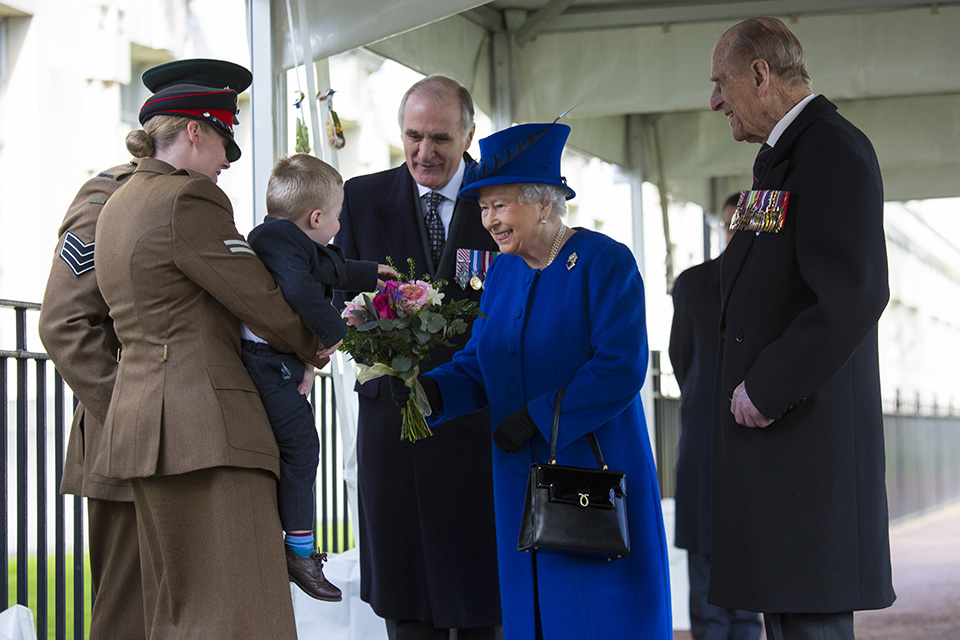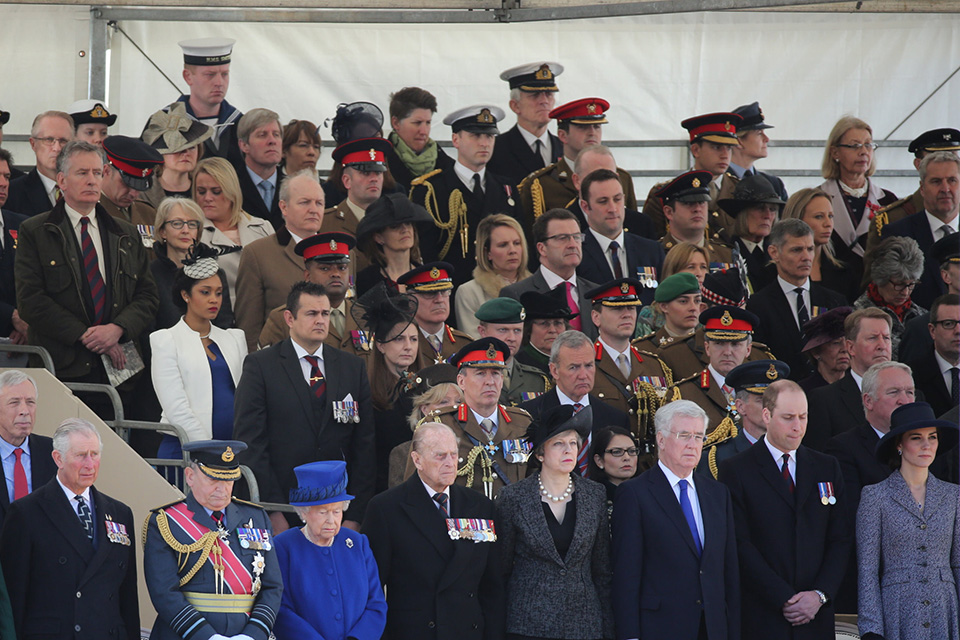News story: Iraq and Afghanistan Memorial unveiled in London
The new Memorial recognises the contributions of the UK Armed Forces and all UK citizens who deployed in the Gulf region, Iraq and Afghanistan from 1990-2015, and those who supported them back home.
At 1100 am, a Service of Dedication was conducted from a specially constructed Drumhead on Horse Guards Parade with The Queen, Prime Minister Theresa May and the Defence Secretary, Sir Michael Fallon, in attendance. They were joined by His Royal Highnesses The Duke of Edinburgh, The Duke and Duchess of Cambridge, Prince Henry of Wales and other Members of the Royal Family. Readings were given by Prince Henry and a Ministry of Defence Civil Servant Victoria Whittaker who deployed to Afghanistan in 2014.
Following the Drumhead Service, the Memorial was formerly unveiled at a short ceremony in Victoria Embankment Gardens, in front of the Ministry of Defence, where Her Majesty The Queen met a small number of civilian and military guests who contributed to the Iraq and Afghanistan conflicts, and Memorial Trustees. Prior to leaving, Her Majesty was presented with a posy by two-year-old Alfie Lunn whose father Serjeant Mark Lunn, 29, deployed to Iraq in 2007 and was awarded a Military Cross for his actions during a fire-fight in Basra. Alfie’s mother, Corporal Michele Lunn, deployed to Afghanistan in 2014/15.
Speaking after the event, Alfie’s father Serjeant Mark Lunn said:
I’m incredibly honoured to be here today and especially proud to see our son Alfie present a posy to The Queen. This memorial is a wonderful way to recognise the duty and service of so many military and civilians.

Designed by sculptor Paul Day, the Iraq and Afghanistan Memorial is positioned nearby monuments to the Second World War and the Korean War.
The new Memorial features two large stones – one representing Iraq and the other Afghanistan – linked by a giant, two-sided bronze tondo depicting the Memorial’s theme of “Duty and Service”. The Memorial gives equal prominence to military and civilian contributions, including, amongst others, the delivery of healthcare and humanitarian work. It is specifically intended to be inclusive of all those who contributed and therefore bears no names.
Between 1990 and 2015, thousands of British citizens put themselves in harm’s way, protected our nation’s interests, helped those in danger and worked to improve the lives of those in other countries. 682 Service personnel lost their lives in the three conflicts. Civilians from a vast breadth of organisations worked for more than two decades in areas such as aid distribution, education, healthcare and governance to help the citizens of both Iraq and Afghanistan.
The Queen was joined by over 2,000 people for the event, and guests were representatives of the many groups, military and civilian, including current Service personnel, veterans, Civil Servants and aid workers, whose efforts are marked by the Memorial, and also families of the fallen.
Prime Minister Theresa May said:
The missions in Iraq and Afghanistan called on hundreds of thousands of our military and civilian personnel to put their lives on the line in a heroic effort to help secure greater peace and stability in some of the most hostile environments that we have ever known. Today we honour the extraordinary courage and dedication of every one of those British men and women who stepped forward to answer that call. We pay tribute to those families who spent long periods apart and we stand with the friends and families of all who lost loved ones.
Secretary of State for Defence Sir Michael Fallon said:
It is vital that we recognise our Armed Forces and civilians who contributed, both abroad and at home, to the campaigns in the Gulf, Iraq and Afghanistan. Today’s service is an appropriate occasion to honour their immense efforts and sacrifices. We should also reflect on the continued service of the men and women of our Armed Forces deployed around the world today to help make us safer at home.

The idea of creating a national Memorial commemorating the UK’s military operations and reconstruction efforts, from the liberation of Kuwait in 1990 through to the end of combat operations in Afghanistan, originated in spring 2014 and was supported by the Government. A board of Trustees, whose Chairman is former Chief of the Defence Staff, Lord Stirrup, ran the project, which has Government backing and financial support from LIBOR funding and Sun readers. The unveiling was organised by the Ministry of Defence, on the Trustees’ behalf, in partnership with The Royal British Legion, which hosted a reception after the service.
The combined events that the memorial covers represent the longest post-war continuous overseas deployment of UK forces (excepting garrison duties), and the most intensive extended period of operations undertaken since the Second World War.